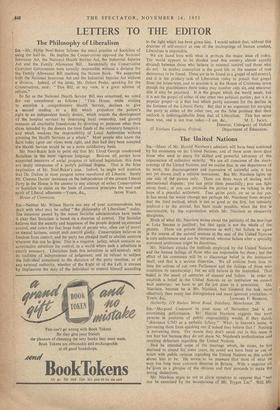The United .Nations
SIR,—Many of Mr. Harold Nicolson's admirers will have been saddened by his comments on the United Nations, and of these none more -than those who used to enjoy his skilled and powerful advocacy of the organisation of collective security. We are all conscious of the short- comings of the United Nations, and we realise that, in one department of its work, the discouragement and repression of unlawful acts, it has not yet shown -itself a reliable instrument. But Mr. Nicolson lights up one side of the picture only. There are three ways of dealing with international disputes: you can settle them peacefully ; .you can fight about them ; or you can persuade the parties to go on talking in the hope of a peaceful settlement. Twit qu'on park, on ne se bat pos. It has saved the world .(though not perhaps Mr. Nicolson) from despair that the third method, which is not se good as the first, but infinitely preferab e to the second, has been made possible, when the first is unattainable, by the- organisation which Mr. Nicolson so eloquently denigrates.
Much of what Mr. Nicolson writes about the publicity of the meetings at Lake Success is justified ; but that again is not the whole of the picture. There are private discussions as well ; but failure to agree in the course of the normal sessions at the seat of the United Nations is only unfortunate and can be retrieved, whereas failure after a specially convened conference might be disastrous.
Mr. Nicolson attacks the methods employed by the United Nations and the human failings of those who are responsible for them ; but the effect of his comments will be to discourage belief in the institution itself, and that is a serious disservice. We all criticise from time to time the actions of our own Parliament and the failings of those who constitute its membership ; but we still believe in the institution. That +chef is the result of centuries of success and failure. In order to establish a belief in the United Nations as an institution we cannot
wait centuries: we have to get the job done in a generation. Mr. Nicolson, because he is Mr. Nicolson, has hindered the task more effectively than many less distinguished and more ignorant journalists.—














































































 Previous page
Previous page